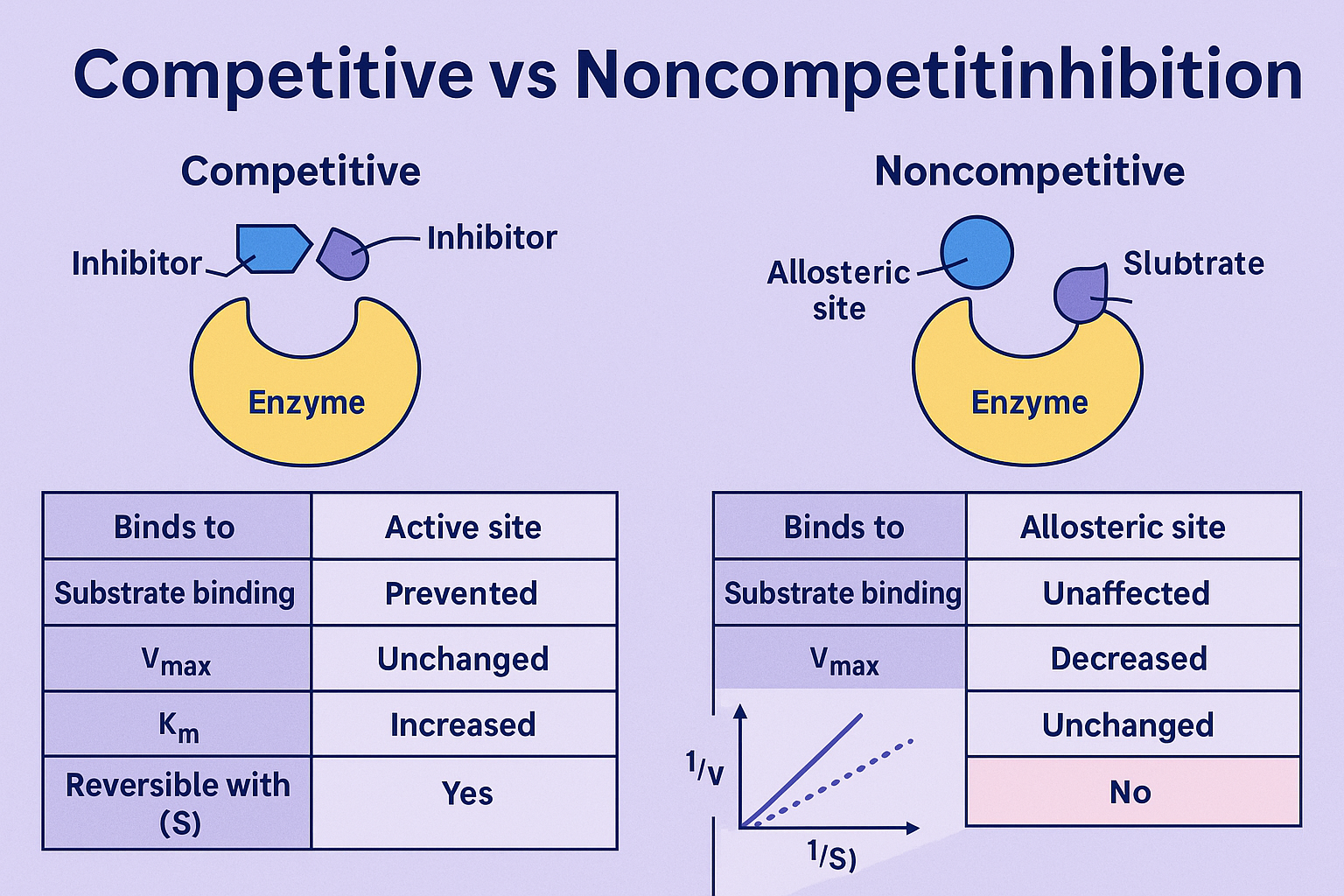🧠 Competitive vs Noncompetitive Inhibition: Enzyme Kinetics for USMLE Step 1
You’ll see enzyme inhibition questions on Step 1 across biochemistry, pharmacology, and metabolism. A firm grasp of competitive vs noncompetitive inhibition is vital for interpreting Vmax, Km, and Lineweaver-Burk plots — and for connecting this to real drug mechanisms.
Let’s break down the differences with clear tables, visuals, and mnemonics.
📈 Key Definitions
| Vmax | Maximum rate of enzyme reaction (when enzyme is saturated) |
| Km | Substrate concentration at which velocity is 50% of Vmax; inversely related to enzyme affinity |
⚔️ Competitive vs Noncompetitive Inhibitors
| Feature | Competitive | Noncompetitive |
|---|---|---|
| Binds to | Active site | Allosteric site |
| Substrate binding | Prevented | Unaffected |
| Vmax | Unchanged | Decreased |
| Km | Increased | Unchanged |
| Reversible with ↑ [S]? | ✅ Yes | ❌ No |
| Lineweaver-Burk | Lines intersect on Y-axis | Lines intersect on X-axis |
💊 Step 1 Drug Examples
| Drug | Inhibition Type | Notes |
|---|---|---|
| Statins (e.g. atorvastatin) | Competitive | Compete with HMG-CoA for reductase binding |
| Allopurinol | Competitive | Inhibits xanthine oxidase (gout treatment) |
| Digoxin | Noncompetitive | Inhibits Na⁺/K⁺-ATPase indirectly |
| Noncompetitive enzyme inhibitors | Often irreversible | Lower Vmax; effect not overcome by substrate |
🧠 Mnemonics to Remember
“Compete at the active seat”
→ Competitive = Active Site + Same Vmax
“Noncomps don’t care about seats”
→ Noncompetitive = Allosteric Site + Vmax drops
🩺 Clinical Clues on Step 1
A patient is given Drug X which competes with a natural substrate for the active site of an enzyme. Increasing the dose of the substrate reverses the inhibition.
✅ Answer: Competitive inhibition
🧠 High-yield concept: These are reversible and structurally similar to the substrate.
📉 Lineweaver-Burk Plot Quick Recap
| X-axis (1/[S]) | Inverse of substrate concentration |
| Y-axis (1/V) | Inverse of reaction velocity |
Competitive: ↑ Km (X-intercept shifts), same Y-intercept
Noncompetitive: ↓ Vmax (Y-intercept rises), same X-intercept
🎯 Call-To-Action
Ready to master all of enzyme kinetics with KOTC visuals and drills?
🧠 Dive into our Adaptive Qbank + Classroom Visuals now:
🔗 https://kingofthecurve.org/trial-sessions
🎓 Or grab lifetime access to unlock all Step 1 biochemistry pathways:
🔗 https://kingofthecurve.org/free-lifetime
Frequently Asked Questions (FAQs)
-
Aim for 4-6 focused hours, ensuring you incorporate breaks to avoid burnout.
-
Practice mindfulness techniques, take practice exams under realistic conditions, and maintain a balanced lifestyle.
-
Set short-term goals, seek support from mentors, and reward yourself for small achievements.
-
Regular exercise improves focus, reduces stress, and enhances overall mental clarity.
-
KOTC offers personalized learning tools, gamification features, and adaptive question banks to help students stay on track without burnout.


